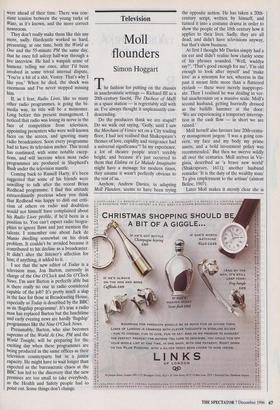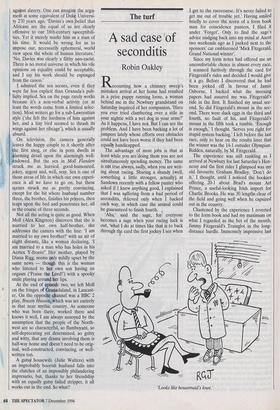Television
Moll flounders
Simon Hoggart
The fashion for putting on the classics in anachronistic settings — Richard III as a 20th-century fascist, The Duchess of Malfl in a space station — is regrettably still with us. I've always thought it unpleasantly con- descending.
Do the producers think we are stupid? Do we walk out saying, 'Golly, until I saw the Merchant of Venice set on a City trading floor, I had not realised that Shakespeare's themes of love, cupidity and vengeance had a universal significance'? In my experience, a lot of theatre people aren't terribly bright, and because it's just occurred to them that Elektra or Le Malade Imaginaire might have a message for modern times, they assume it wasn't perfectly obvious to the rest of us.
Anyhow, Andrew Davies, in adapting Moll Flanders, seems to have been trying the opposite notion. He has taken a 20th- century script, written by himself, and turned it into a costume drama in order to show the people of the 18th century how it applies to their lives. Sadly, they are all dead, and didn't have televisions anyway, but that's show business.
At first I thought Mr Davies simply had a tin ear and didn't realise how clunky some of his phrases sounded. 'Well, waddya say?', 'That's good enough for me', 'I'm old enough to look after myself and 'make love' as a synonym for sex, whereas in the past it meant little more than a fluttered eyelash — these were merely inappropri- ate. Then I realised he was dealing in ver- bal anachronism on a massive scale. Moll's second husband, getting hurriedly dressed as the bailiffs hammer at the door: 'We are experiencing a temporary interrup- tion in the cash flow — in short we are ruined.'
Moll herself also favours late 20th-centu- ry management jargon: 'I was a going con- cern, my face and my body my prime assets, and a bold investment policy was recommended.' But then we swerve wildly all over the centuries. Moll arrives in Vir- ginia, described as 'a brave new world' (Shakespeare, 1611); another husband remarks: 'It is the duty of the wealthy man/ To give employment to the artisan' (almost Belloc, 1907).
Later Moll makes it sternly clear she is agahist slavery. One can imagine the argu- ment at some equivalent of Duke Universi- ty 270 years ago. `Davies's own belief that Africans are the equal of us are clearly offensive to our 18th-century susceptibili- ties. Yet it merely marks him as a man of his time. It would be wrong for us to impose our, necessarily ephemeral, world view upon the whole of human literature.' 'No, Davies was clearly a filthy non-racist. There is no moral universe in which his vile opinions on equality could be acceptable, and I say his work should be expunged from the canon.'
I admired the sex scenes, even if they were far less explicit than Granada's pub- licity implied. Sex on the page rarely works because it's a non-verbal activity (or at least the words come from a limited selec- tion). Most writers go for a sub-Lawrentian style ('she felt the hardness of him against her, and a tiny bird seemed to thrash its wings against her ribcage'), which is usually absurd.
On television, the camera generally leaves the happy couple to it shortly after the first snog, or else in porn dwells in alarming detail upon the alarmingly well- endowed. But the sex in Moll Flanders struck me as hurried, good-humoured, jokey, urgent and, well, sexy. Sex is one of those areas of life in which our own experi- ence is all we have to go on, but these scenes struck me as pretty convincing, except for the bit where husband number three, the brother, finishes his prayers, then leaps upon the bed and penetrates her, all in the course of three seconds.
Not all the acting is quite as good. When Moll (Alex Kingston) discovers that she is married to her own half-brother, she addresses the camera with the line: 'I am married to my own brother!' with an air of slight distaste, like a woman declaring, 'I am married to a man who has holes in his Aertex Y-fronts!' Her mother, played by Diana Rigg, seems only mildly upset by the same news — though this is the woman who listened to her own son having an orgasm (Praise the Lord!') with a spooky smile playing around her lips.
At the end of episode two, we left Moll on the fringes of Granadaland, in Lancast- er. On the opposite channel was a BBC 2 play, Brazen Hussies, which was set entirely in that near mythic country. As someone who was born there, worked there and knows it well, I am always annoyed by the assumption that the people of the North- west are so characterful, so flamboyant, so self-deprecating yet determined, so gritty and witty, that any drama involving them is half-way home and dbesn't need to be orig- inal, well-constructed, convincing, or well- written too.
A gutsy housewife (Julie Walters) with an improbably boorish husband falls into the clutches of an impossibly philandering impresario, but, thanks to her friendship with an equally gutsy failed stripper, it all works out in the end. So what?



















































































 Previous page
Previous page